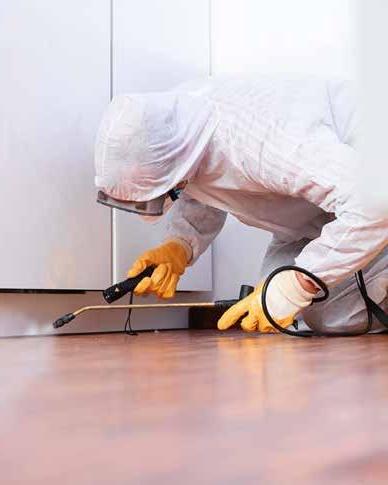
3 minute read
Pest control… fi nd out how to
Why the pandemic is a pest’s best friend
Nick Bryan, Senior Pest Elimination Manager at Ecolab
When our kitchens fell silent during lockdown, the only customers enjoying the sudden lack of activity were the most unwanted ones
Rats, cockroaches and fl ies love eating out at places where hygiene procedures have slipped. So as restrictions hopefully ease and the hustle and bustle returns, Nick Bryan, Senior Pest Elimination Manager at Ecolab, explains how venue owners and tenants can stay ahead of the game (and pests!)
Who is responsible for pest control in my venue?
The tenant is responsible for pest control in the tenanted areas such as the restaurant and seating area, whereas the landlord would be responsible for common areas such as the communal bin store and service corridors.
What impact will the lockdown have on pest activity in venues?
Pests don’t follow lockdown rules, unfortunately! They are always looking out for somewhere warm and cosy to nest, have babies and eat.
But if venues have a well laid-out pest management programme and took the right steps before shutting, then at least the risks are minimised.
Even if the facility was left clean with food stored away and bins disposed of, pests will have been uninterrupted, so it is best to be alert.
When it’s time to re-open, check inside and out for tell-tale signs of activity such as droppings, damaged foodstuff s and unusual smells.
How can we keep pests at bay?
Before re-opening, re-educate your staff . Employees are your fi rst defence so teach them to alert management to the signs of droppings, nests, and gnawed/ spoiled packaging because time is defi nitely of the essence.
Store all food in sealed containers and cover bins to eliminate rodents’ food supply. Keep the place clean (including drains to avoid cockroaches and fl ies) and tidy to reduce hiding places.
Don’t let them in! Close the door once you’re done and fill in holes and gaps.
What do we do if we get pests?
It is very much a matter of when you will get pests, rather than if.
If you store and prepare food, you are particularly at risk. This is why putting preventative measures in place is so important.
Pests come in different shapes and sizes, from rodents and cockroaches to flies, and even stored-product pests. This is why it’s important to talk to professionals who can recommend specific best practices tailored to your outlet and its needs.

What is the best way for my business to avoid getting pests?
Their presence in a food or drink preparation area can have a devastating effect on your hygiene ratings, your brand, reputation and your business finances. It needs to be taken seriously.
Professional science-based protocols that tackle the root cause at your specific outlet are the best way to get peace of mind because some kitchens may have different issues and requirements than others.
An Integrated Pest Management programme will tackle the root cause with a science-based approach.
So should I bring in external help to prevent and protect my business?
At Ecolab, we’ve continued working with our clients from the food and beverage industry, restaurants, hotels, hospitals and offices, even while their businesses were shut.
Experts understand the safety inspection and audit requirements for each of these venue types, as well as the importance of protecting your business discreetly.
The best firms will constantly innovate. We saw 40% of restaurants with interior rodent activity also having ceiling rodent activity, so we developed a ceiling monitoring device.
Having a partner with proven, science-based expertise protects your brand and maintains a safe, healthy and pest-free environment.
If you’d like to make sure your venue is pest-free, contact Ecolab for a free site survey: brws.it/pestsurvey
A negative customer review that includes a photo of a pest spreads two to three times faster







